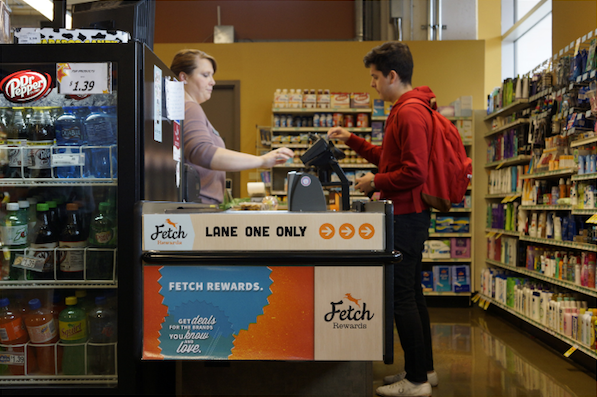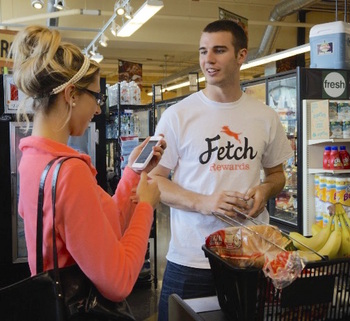UW-Madison spinoff wants to help out in the grocery aisle

A student shopper uses the new Fetch Rewards lane at Fresh Madison Market. Customers press “checkout” on their phone and it sends the information to the cashier, who has a Fetch Rewards tablet.
Photo: Lauren Richards
When Wes Schroll moved from a dorm into an apartment and began grocery shopping, he hated it.
“Every single one had the same issues,” he says. “I had no idea how much I’d spent until I checked out. Coupons were a pain in the butt, so I never used them. And the checkout was inefficient.”
Pointing to his smartphone, he adds, “I figured there had to be some way to utilize these pieces of technology that everyone has to streamline the process.”
So he built a company, Fetch Rewards, whose aim is to cut your time in the checkout lane and make a small dent in your grocery bill.
Shoppers scan items with the Fetch Rewards app as they place them into the cart. Coupon discounts are applied automatically and the app tracks how much you’re spending.

UW-Madison student Alexandra Cirone chats with Fetch Rewards co-founder Wes Schroll as she uses the app to buy groceries.
Photo: Lauren Richards
At checkout, rather than scanning every item, the clerk checks a few at random to make sure the app has caught everything, then bills the customer based on the app’s tally.
The three-year-old company now operates in more than 20 stores and has contracts for at least 30 more, Schroll says. “By the end of the year, we want to be in north of 60 individual stores. We are aiming at rapid expansion, as fast as we possibly can.” UW–Madison was instrumental in his success, he says.
Schroll, 21, is a natural businessman, personable and persuasive. “As early as my parents can remember, they said I loved selling.” In high school, he made money washing and waxing cars. “We lived near a golf course, and my brother and I would find golf balls and sell them back to golfers; it was really profitable.”
Schroll came to the university “mostly because I was attracted to the entrepreneurship programs.” Big Ten athletics helped, but so did the presence of “45,000 people to network with. I love networking. Any entrepreneur does.”
When he was 16 and still in high school, Schroll visited campus and met with Jon Eckhardt, executive director of the Weinert Center for Entrepreneurship at the Wisconsin School of Business.
“(Schroll) didn’t want to talk about anything else except his business. That’s a very good sign. … He was just the kind of person we are trying to attract to our entrepreneurship program and to the state of Wisconsin.”
John Eckhardt
At the time, Schroll was developing a flash card study device for sale to high school and college students, and he had already interested Staples and dozens of school districts.
“In an entrepreneur, I look for somebody who is focused and taking action, not just talking,” Eckhardt says.
“First, he didn’t want to talk about anything else except his business. That’s a very good sign,” Eckhardt says. “Second, he was making measurable progress. He was just the kind of person we are trying to attract to our entrepreneurship program and to the state of Wisconsin.”
Once enrolled, Schroll benefited from free office space at a student business incubator and assistance from the Law and Entrepreneurship Clinic. He also met Tyler Kennedy, whom he calls a “co-founder” of Fetch, at the business school. Kennedy, who has since graduated, handles operations for Fetch.
Fetch tied for second place in the 2013 Burrill Business Plan Competition from the Wisconsin School of Business, and won $5,000 and a year’s free rent at University Research Park.
To meet the time crunch needed to develop the business, Schroll left the university that summer.
The rapid growth has been fueled by $8.5 million in capital. Fetch has 37 full-time employees at offices on the Capitol Square in Madison. “We’ve been on the Square for about a year,” Schroll says. “We are looking for new space right now, and are trying to grow and find talent.”
For stores, one sales point is offering something new and exciting to a business where change is slow. In addition, Schroll says, “we have been able to show across all our stores that the Fetch customer spends more, does more trips, and more of them say they are shopping at our stores exclusively.”
Still, Schroll says the startup world is not for the faint-hearted. “In some businesses, people talk about good months and bad months. In a startup, you have good hours and bad hours. Being able to figure out how to go through that completely level is the hardest thing I ever had to try to figure out.”
Tags: alumni, business, entrepreneurship, spinoffs




